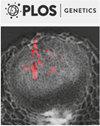NF-κB因子Relish维持发育中果蝇淋巴腺中血液祖细胞的平衡
IF 3.7
2区 生物学
Q1 Agricultural and Biological Sciences
引用次数: 0
摘要
果蝇的产后造血在很大程度上取决于幼虫造血器官/淋巴腺中的祖细胞储备。在幼虫阶段,淋巴腺祖细胞会逐渐积累活性氧(ROS),这对祖细胞的分化至关重要。研究表明,ROS 会引发 JNK(c-Jun 激酶)活化,从而上调脂肪酸氧化(FAO),促进祖细胞分化。耐人寻味的是,尽管存在 ROS,但整个祖细胞池在幼虫晚期并不会同时分化。通过表达分析、遗传操作和药理学方法,我们发现果蝇的 NF-κB 转录因子 Relish(Rel)通过抑制 JNK 的活化,使祖细胞池免受新陈代谢途径的影响,从而使它们进入分化程序。尽管 ROS 是祖细胞分化的代谢信号,但 ROS 的输入受到发育信号 TAK1 的监控,而 TAK1 则受 Relish 的调控。这一发育回路确保了ROS刺激的祖细胞储备不会完全耗尽。我们的研究揭示了在发育过程中,NF-κB 类因子与代谢途径的整合似乎对调节细胞命运的转变至关重要。本文章由计算机程序翻译,如有差异,请以英文原文为准。
The NF-κB Factor Relish maintains blood progenitor homeostasis in the developing Drosophila lymph gland
Post-larval hematopoiesis in Drosophila largely depends upon the stockpile of progenitors present in the blood-forming organ/lymph gland of the larvae. During larval stages, the lymph gland progenitors gradually accumulate reactive oxygen species (ROS), which is essential to prime them for differentiation. Studies have shown that ROS triggers the activation of JNK (c-Jun Kinase), which upregulates fatty acid oxidation (FAO) to facilitate progenitor differentiation. Intriguingly, despite having ROS, the entire progenitor pool does not differentiate simultaneously in the late larval stages. Using expression analyses, genetic manipulation and pharmacological approaches, we found that the Drosophila NF-κB transcription factor Relish (Rel) shields the progenitor pool from the metabolic pathway that inducts them into the differentiation program by curtailing the activation of JNK. Although ROS serves as the metabolic signal for progenitor differentiation, the input from ROS is monitored by the developmental signal TAK1, which is regulated by Relish. This developmental circuit ensures that the stockpile of ROS-primed progenitors is not exhausted entirely. Our study sheds light on how, during development, integrating NF-κB-like factors with metabolic pathways seem crucial to regulating cell fate transition during development.
求助全文
通过发布文献求助,成功后即可免费获取论文全文。
去求助
来源期刊

PLoS Genetics
生物-遗传学
CiteScore
8.10
自引率
2.20%
发文量
438
审稿时长
1 months
期刊介绍:
PLOS Genetics is run by an international Editorial Board, headed by the Editors-in-Chief, Greg Barsh (HudsonAlpha Institute of Biotechnology, and Stanford University School of Medicine) and Greg Copenhaver (The University of North Carolina at Chapel Hill).
Articles published in PLOS Genetics are archived in PubMed Central and cited in PubMed.
 求助内容:
求助内容: 应助结果提醒方式:
应助结果提醒方式:


